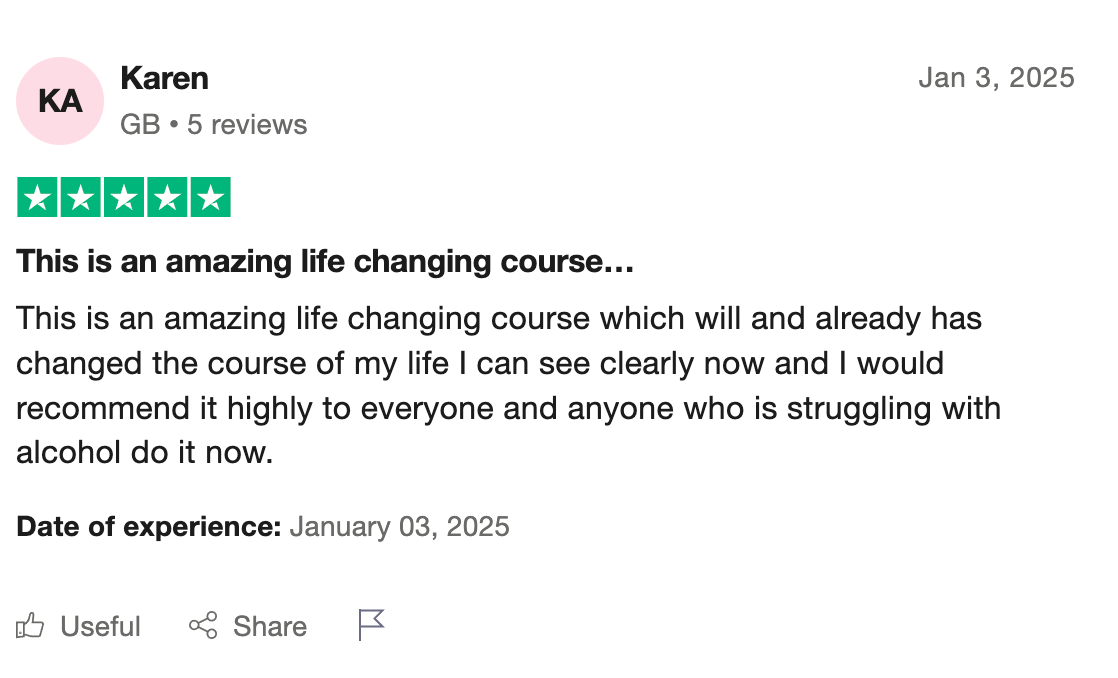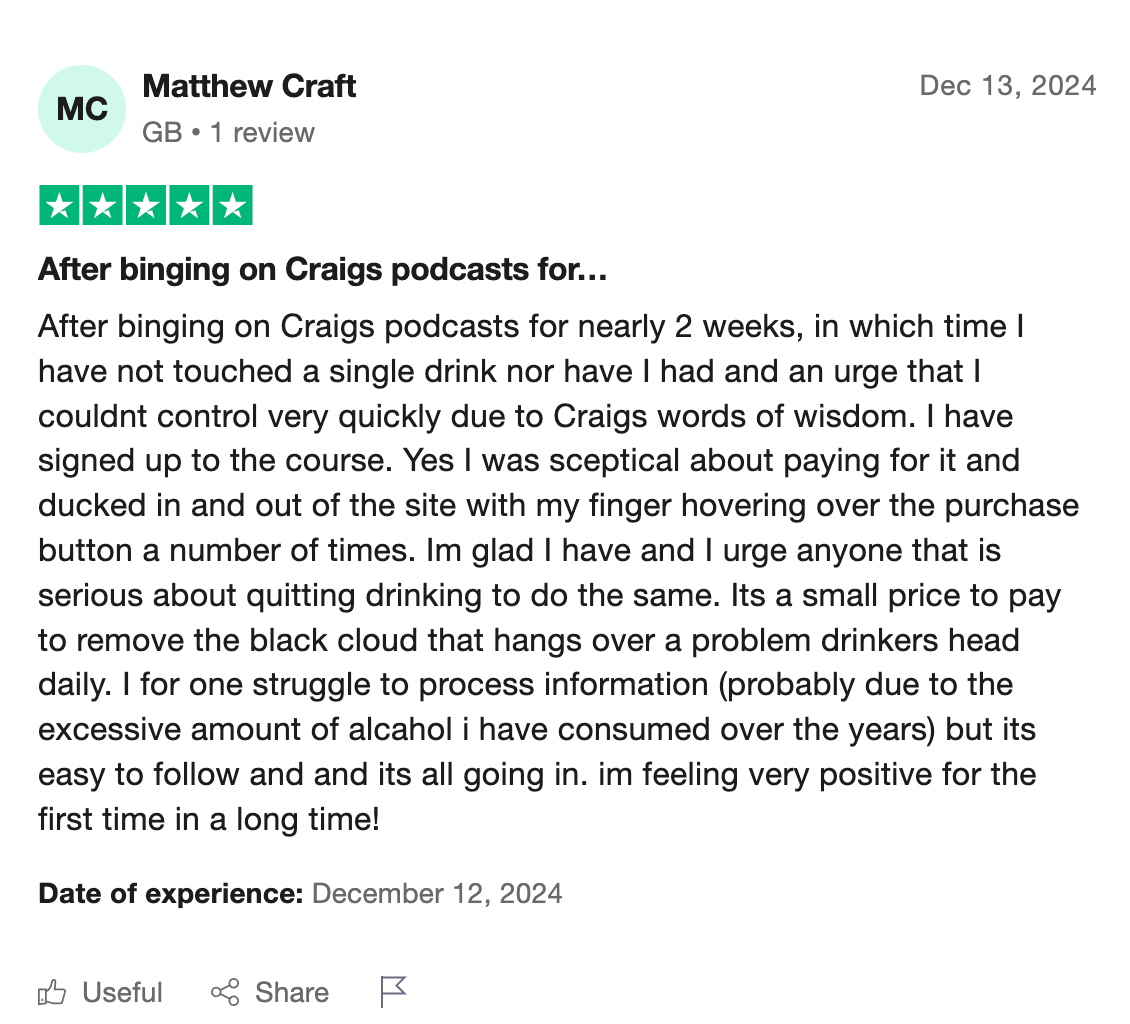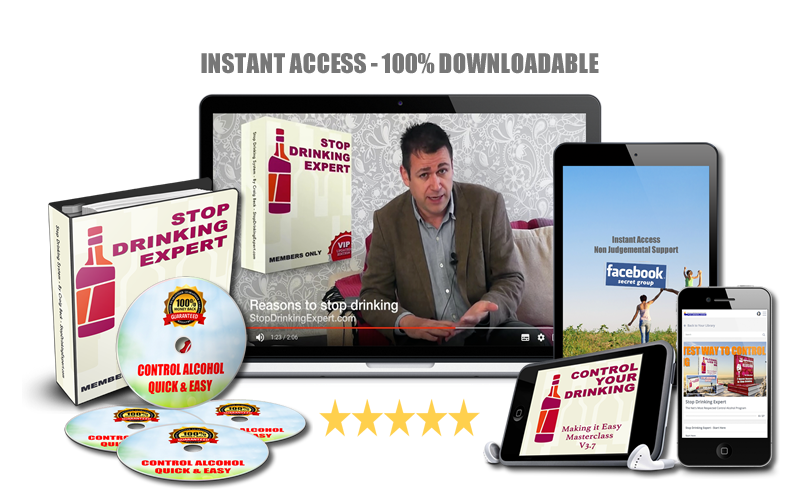Why The Health Benefits Of Red Wine Are A Big Fat Lie
You pull the cork with a flourish, watch ruby liquid swirl, and tell yourself one more time that doctors insist a nightly glass protects the heart. The story feels comforting, almost cosy, like wrapping up in a favourite wool blanket on a windy Yorkshire evening. Deep down though, a whisper suggests the claim might be flimsier than the cheap corkscrew in your kitchen drawer. That inner nudge deserves some daylight.
Wine marketing took a scientific footnote and inflated it into a cultural anthem. The so called French Paradox, a single observation from the early nineties, suggested lower rates of coronary disease in Bordeaux citizens despite buttery cuisine. Newspapers grabbed the headline, vineyards grabbed the megaphone, and suddenly resveratrol became the new fairy dust. Nobody stopped to ask whether those slim Parisians also walked everywhere, ate smaller portions, or snacked on fresh fruit rather than crisps.
Fast forward three bustling decades and modern epidemiologists have poked more holes in the red wine health myth than in a fisherman’s net. Huge cohort studies now reveal that even light alcohol raises the risk of stroke, breast cancer, and cognitive decline. Yet slogans still adorn glossy magazines promising longevity in every sip. The truth moves slowly when billion pound advertising budgets push against it like tidal waves against a fragile dinghy.
Before we explore the data let us acknowledge the real motive behind the myth. If a product as indulgent as wine appears medicinal, we face no inner conflict while topping up the glass. The brain loves permission. Sadly the liver, the heart, and the delicate hippocampus region of your memory centre cannot read lifestyle pages. They react only to chemistry not witty slogans.
The Not So Wonderful World Of Resveratrol
Supporters of the grape cure often point to resveratrol, an antioxidant found in grape skins. Laboratory mice fed concentrated resveratrol enjoyed improved insulin sensitivity and longer lifespans. Lovely news for rodents, yet humans would need to drink roughly one hundred bottles a day to match those dosages. Your credit card would explode first, closely followed by your pancreas. Moderate drinkers therefore absorb a trivial sprinkle of the compound alongside a hefty dose of cancer class one carcinogen ethanol.
When researchers isolated resveratrol supplements and gave them to volunteers, measurable benefits vanished faster than free canapés at a press launch. The antioxidant theory crumbled, leaving marketing executives scrambling for fresh angles. They pivoted to stress relief and social bonding, ignoring that deep breathing and laughter achieve both without the morning dehydration. For a deeper dive into stress related drinking patterns visit this article on escaping reality after you finish here.
You may also recall headlines claiming that wine raises good cholesterol. Early papers indeed observed slight bump ups in HDL scores. Later work revealed those same participants consumed more colourful vegetables, exercised regularly, and enjoyed stronger community ties. Lifestyle, not liquor, carried the protective shield. Blaming cabernet for their success is like crediting the paint on your car for a safe commute while ignoring the brakes.
Scientists at Oxford recently reviewed hundreds of studies and concluded that publication bias—favouring positive results—distorted the field for years. Neutral or negative findings languished in dusty filing cabinets. At last, meta analyses place the nail firmly in the cask: the smallest amount of alcohol still raises overall mortality. That result applies equally to merlot, whiskey, and umbrella topped cocktails served at beach resorts.
The Silent Saboteur Inside Your Cells
Let us step inside the bloodstream for a moment. Ethanol travels freely, slipping across cell walls like a pickpocket through an open door. Your hardworking liver converts it into acetaldehyde, a nasty toxin implicated in DNA damage. Even low exposures trigger tiny breaks that accumulate over months until a mutation plants the seed for tumours. Red wine colour does not neutralise that threat; it only stains kitchen counters when spilled.
The cardiovascular system suffers too. Alcohol stiffens arterial walls and elevates blood pressure, two hefty risk factors for heart attack. Cardiologists now measure a marker called atrial strain and find it worsens after evenings of so called sensible drinking. For detailed heart mechanics, glance at this heart article later on. If you spot yourself popping statins while sipping shiraz you might be fighting a battle on two fronts.
The brain meanwhile endures shrinking grey matter and disrupted REM cycles. Do you wake at three in the morning, pulse drumming, thoughts racing like greyhounds at the track? That is glutamate rebound, your excitatory neurotransmitter surging after alcohol’s sedative fade. Over time these nightly roller coasters erode mood stability. Depression sneaks in, as explained in this sobering piece. No bouquet of dark cherry aromas justifies that toll on mental clarity.
Reproductive health does not escape either. Men experience lowered testosterone and impaired performance, topics candidly unpacked in this post on intimacy. Women face increased oestrogen and heightened breast cancer risk. These biological truths care little about grape variety or vineyard elevation. Alcohol is alcohol even when served in expensive crystal.
The Marketing Machine Keeps Pouring
Why then does the myth cling on like red stains to a white shirt? Simple: money. The global wine market hovers around four hundred billion dollars. A single percentage point shift in consumption shakes share prices and boardrooms. Consequently, public relations teams craft seductive imagery of sophisticated people swirling deep scarlet in candlelight as if wisdom itself lurks at the bottom of the glass. Rarely do adverts show the same people yawning at noon meetings or skipping morning workouts because heads throb.
Journalists love a sugar coated headline, and wine as medicine fits the bill perfectly. Complexity gets trimmed away; nuance replaces by exclamation points. Add a suave French accent and you have a story that sells magazines and holiday packages to Bordeaux vineyards. The inconvenient reality of hospital wards filled with alcohol induced liver disease cannot compete for column inches against picturesque rolling hills dotted with cypress trees.
Doctors sometimes inadvertently amplify confusion. A busy clinic visit leaves little time to untangle nuanced lifestyle habits. When a physician says moderate drinking appears acceptable based on older guidelines, patients may interpret it as enthusiastic endorsement. Those guidelines however relied on self reported surveys notorious for undercounting actual consumption. Newer data sets using sales figures reveal true intake sits far higher, pushing many so called moderate fans into hazardous territory.
Regulatory bodies also waltz with industry lobbyists. In the United States wine enjoys placement in food pyramids next to olive oil and leafy greens in some government brochures. Meanwhile Britain’s updated Chief Medical Officer guidelines caution that no safe level exists, yet supermarkets still position wine at eye level with cheerful discount stickers. Mixed messages breed convenient denial.
What Really Protects Your Heart
Cardiovascular scientists pinpoint several habits that dwarf any phantom benefit of vino. Daily brisk walking, handfuls of nuts, plenty of fibre rich vegetables, and shared meals where laughter rather than alcohol releases oxytocin. Mediterranean folk who inspired the original paradox spend hours outdoors, chew slowly, and rarely binge. Their glass of table wine is incidental, not medicinal, and often far smaller than pours served in modern London bars.
Polyphenols found in grapes exist in the grapes themselves. Swap the fermented form for fresh red or purple grapes, berries, or a cup of green tea and you capture antioxidants minus the poison. Your gut microbes will clap in delight, fermenting natural fibre into short chain fatty acids that lower inflammation. Imagine that, fermentation inside you rather than inside a wooden barrel in some distant chateau.
If relaxation is the goal, experiment with breathwork, gentle yoga, or simply sitting on the porch watching clouds stroll across the sky. Stress hormones plummet within minutes without taxing the liver. Should social bonding call your name, organise a potluck where everyone brings their favourite sparkling water brand. The conversation will still sparkle; you will remember every witty punch line the next day and your wallet remains happily heavier.
Replace the evening ritual with something tactile. Stir a cinnamon stick into warm apple juice, crush mint into fizzy water, swirl frozen berries through plain yoghurt. The brain enjoys novelty and colour, not necessarily ethanol. Keep a journal of how your body thanks you each morning: clearer skin, calmer digestion, steadier mood. These small proofs accumulate into an unshakeable personal study that no glossy advert can override.
Your Invitation To Investigate Further
If the wine myth has kept you trapped because quitting felt like surrendering health perks, now you hold the keys to honest evaluation. Take a forty eight hour challenge: replace every glass with a tall jug of cucumber water. Notice sleep depth, morning mouthfeel, and overall patience with delays at work. Many readers write to Stop Drinking Expert shocked at how quickly a sense of calm returns once blood sugar no longer whipsaws through the night.
Knowledge alone however rarely shifts habit; community strengthens resolve. Download your complimentary copy of Alcohol Lied To Me at StopDrinkingExpert.com today, and read the opening chapters during tomorrow’s coffee break. Expect light bulbs to flicker on over myths you did not realise you had swallowed. The book walks you through painless mindset shifts, much like discovering a secret garden shortcut on a daily commute. Simpler than you think, faster than you expect.
Imagine a fortnight from now. You pour rich pomegranate juice into your finest stemware, toast your own courage, and feel a genuine glow rise from your chest not your cheeks. No fuzzy head, no chalky tongue, just the quiet thrill of knowing your heart beats easier and your brain cells fire crisp signals. Red wine never delivered that promise; it only borrowed wellbeing on credit. Today you call in the debt and keep the balance.
References
- World Heart Federation. Policy brief on alcohol and cardiovascular disease. 2024.
- Topiwala A. Moderate alcohol intake and brain changes. British Medical Journal 2024.
- Zhang X. Alcohol consumption and cancer burden. Nature Medicine 2023.
- Royal Society for Public Health. The truth about antioxidant claims. Report 2023.
- National Institute for Health Research. Hidden harms of moderate drinking. Review 2024.
Further Reading
Does this sound familiar?
- Drinking to escape stress and to cope with the pressures of life?
- Waking up full of guilt and regret that you drank again last night despite promising that you wouldn't?
- Hiding alcohol or the evidence of your drinking?
- Feeling like you are living a double life because of your drinking?
- Creating silly rules to try and control your drinking (e.g., I will only drink on special occasions)?
The good news is that you are not alone; the better news is that I can help.
Meet Craig Beck, The World's Most Respected Sobriety Coach
Craig Beck, better known as “The Stop Drinking Expert”, turned a 20-year battle with alcohol into a roadmap for lasting freedom. The bestselling author of Alcohol Lied to Me and The Sobriety Secret discovered that traditional routes like Alcoholics Anonymous can feel embarrassing, public, and all too often, entirely ineffective.
His method is different. It shows you:
- Why you drink in the first place—the hidden brain loops alcohol hijacks.
- How to switch off cravings before they even start.
- A willpower-free exit plan you can follow privately, at your own pace—no labels, no awkward meetings, no medication.
Hundreds of thousands worldwide now wake up clear-headed, proud and at peace thanks to Craig’s approach. Will you be the next?
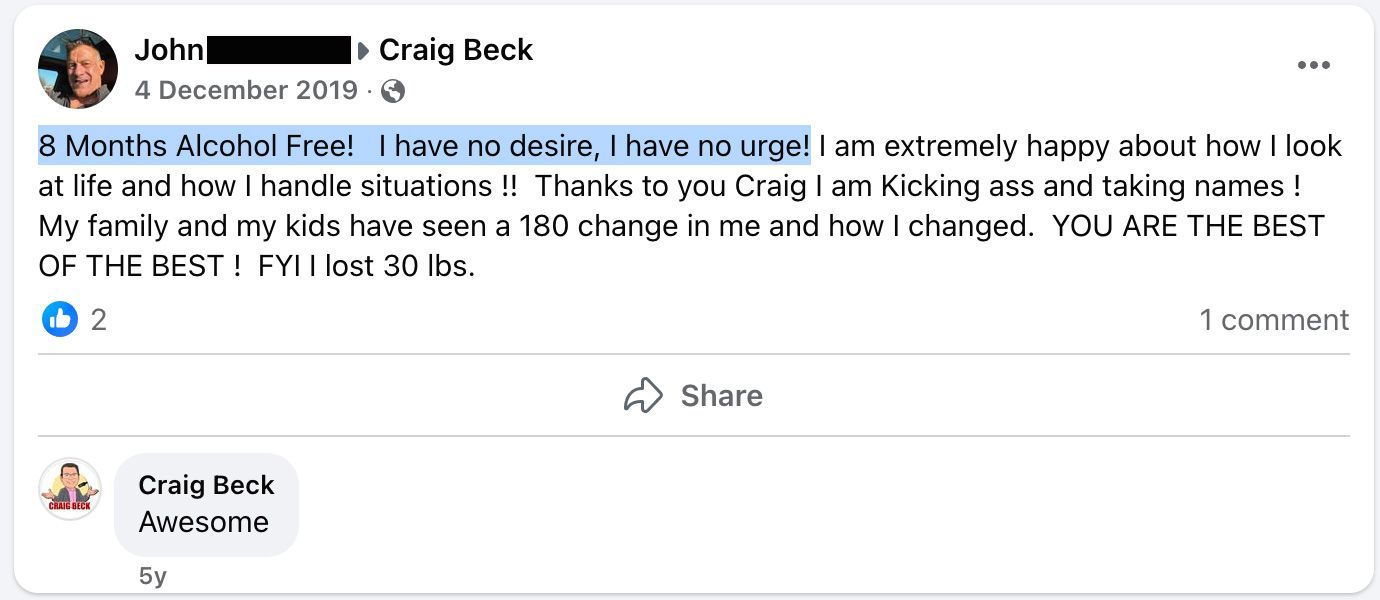
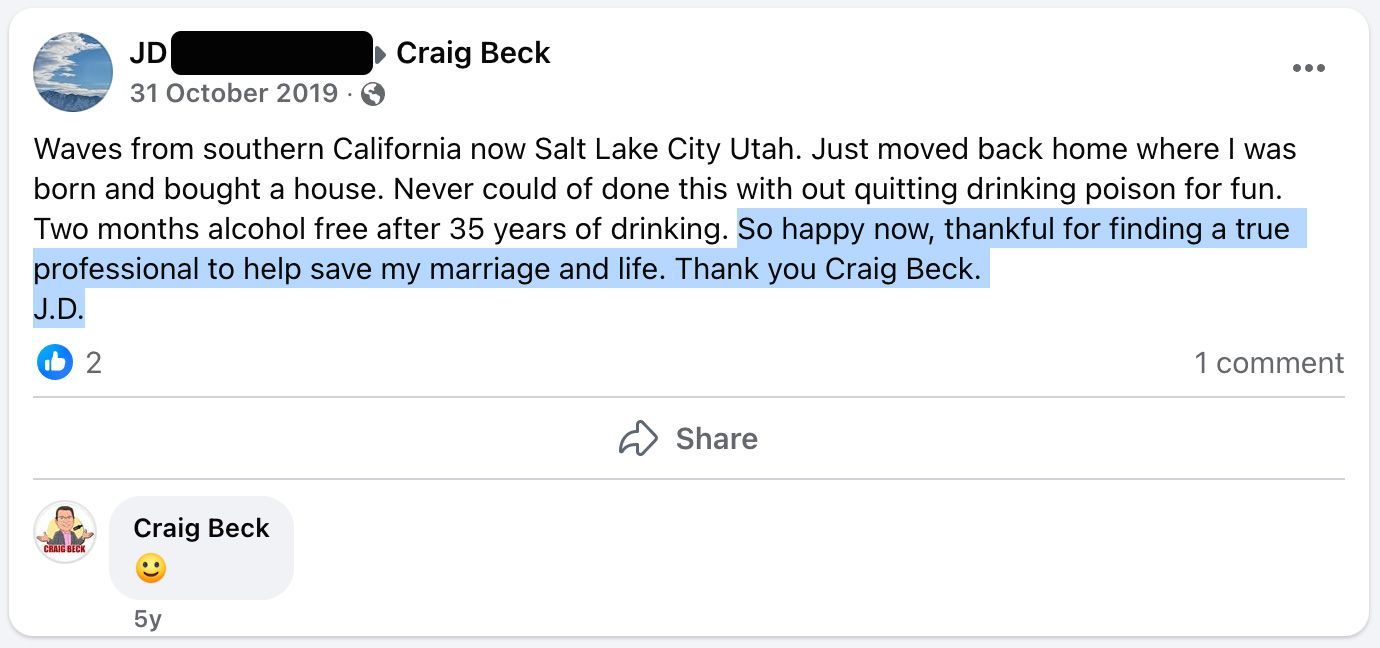
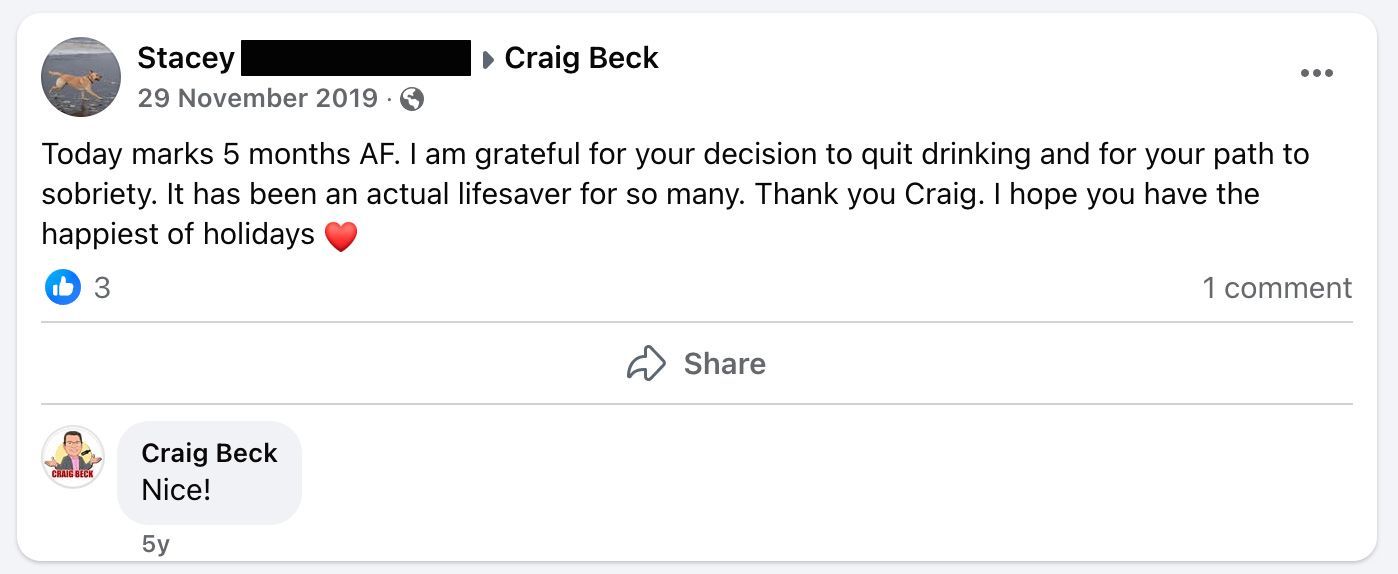
"Effortless Sobriety: The Proven Path to End Problem Drinking"
No one likes asking for help with their drinking—it feels personal and heavy. But if willpower alone hasn’t worked, it’s not because you’re weak. Research indicates that relying solely on grit is unsuccessful approximately 95 percent of the time. You’ve simply been using the wrong tool for the job.
Download my free ebook or decide now get started with the full course and learn:
- Why the game is rigged: how alcohol rewires your brain chemistry and makes “just trying harder” almost impossible.
- A science-based exit plan: practical steps that work quickly, privately, and on your terms.
- No awkward meetings or risky meds: forget the gimmicks—this is about smart strategy, not shame.
`Are you ready to step onto solid ground? Get off the fence, take action, and start taking back control—quickly, confidently, and without the struggle.
Over 250,000 Happy Sober Clients Can't Be Wrong:






